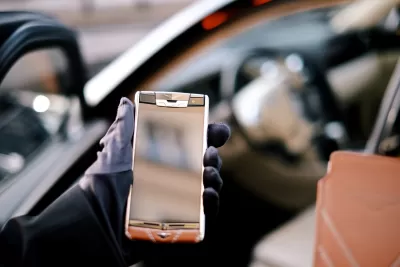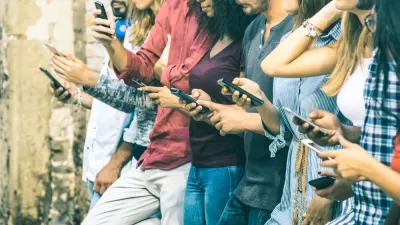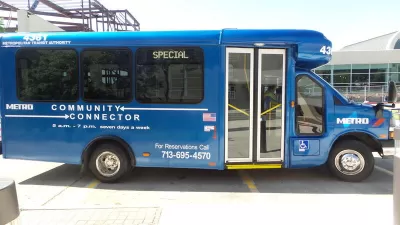On-demand technology has vastly transformed cities by changing everything from the way we shop and travel to how markets target and serve us.

Laura Bliss reflects on what on-demand technology has meant for cities and modern life over the last decade. "Our data as consumers and participants in daily life are not simply passively gathered: Consolidated, it has become the raw material for many of the products and services we buy."
But the reach of data collection extends far beyond just the consumer aspects of our lives. Smart technology tracks people as they move through physical space, public and private, and has raised a slew of questions about how urban spaces should be monitored and policed, notes Bliss.
"[Big data analytics] have also changed the significance of a basic element of what makes [these spaces] urban: dense proximity," says Bliss. Physical conglomeration is no longer a necessity to access goods and services, as companies such as Uber, Airbnb, and Amazon have aptly demonstrated.
And it is this transformation of the urban economy through technology that has been so profound, Bliss points out. "The 2010s were the decade the city became an App Store: an online marketplace where our choices were closely tracked, where that data became part of the products we were using, and where digital clusters of activity displaced real-world transactions."
FULL STORY: How the On-Demand Economy Reshaped Cities

Alabama: Trump Terminates Settlements for Black Communities Harmed By Raw Sewage
Trump deemed the landmark civil rights agreement “illegal DEI and environmental justice policy.”

Study: Maui’s Plan to Convert Vacation Rentals to Long-Term Housing Could Cause Nearly $1 Billion Economic Loss
The plan would reduce visitor accommodation by 25% resulting in 1,900 jobs lost.

Planetizen Federal Action Tracker
A weekly monitor of how Trump’s orders and actions are impacting planners and planning in America.

Waymo Gets Permission to Map SF’s Market Street
If allowed to operate on the traffic-restricted street, Waymo’s autonomous taxis would have a leg up over ride-hailing competitors — and counter the city’s efforts to grow bike and pedestrian on the thoroughfare.

Parklet Symposium Highlights the Success of Shared Spaces
Parklets got a boost during the Covid-19 pandemic, when the concept was translated to outdoor dining programs that offered restaurants a lifeline during the shutdown.

Federal Homelessness Agency Places Entire Staff on Leave
The U.S. Interagency Council on Homelessness is the only federal agency dedicated to preventing and ending homelessness.
Urban Design for Planners 1: Software Tools
This six-course series explores essential urban design concepts using open source software and equips planners with the tools they need to participate fully in the urban design process.
Planning for Universal Design
Learn the tools for implementing Universal Design in planning regulations.
Caltrans
Smith Gee Studio
Institute for Housing and Urban Development Studies (IHS)
City of Grandview
Harvard GSD Executive Education
Toledo-Lucas County Plan Commissions
Salt Lake City
NYU Wagner Graduate School of Public Service





























